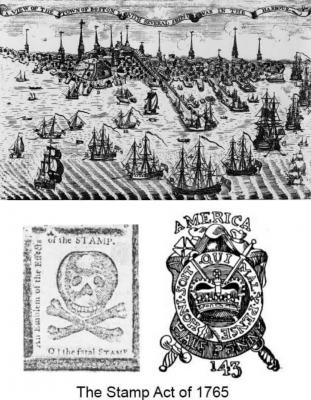
The French and Indian War cost Britain a lot of money. The monarchy’s pockets were almost empty after the wars and it needed money to maintain its soldiers. The British had a solution to this-make the colonies pay heavy taxes. This decision was taken in 1764.
The British decided to tax all sugar products including molasses- a by-product of making sugar-in their American colonies. This is known as the Sugar Act.
The Stamp Act was passed by the British Parliament in 1765. All official documents, newspapers, almanacs, and pamphlets were required to have the stamps. The colonists did not object to this Act as they were not burden-some. But they objected to the lack of their representation in the Parliament. They were not given a voice concerning legislation and this affected them. They rallied behind the phrase, ‘No Taxation Without Representation’. As a result, Britain was forced to remove most such taxes, except for the tax on tea.
Picture Credit : Google



